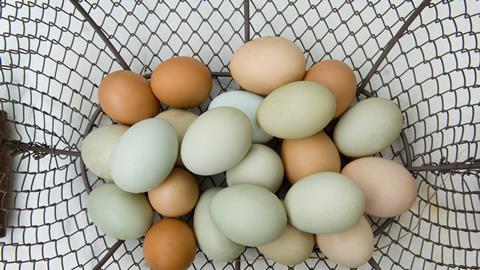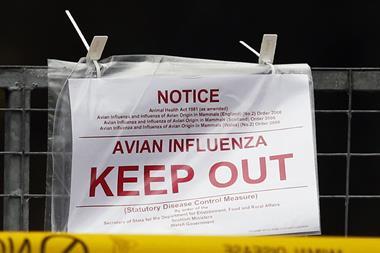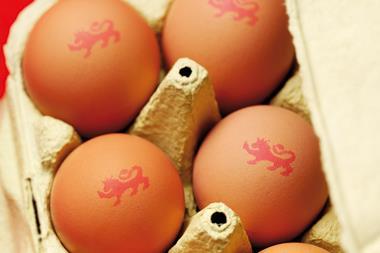Shoppers want their eggs to come with more than a kiss these days, as our research shows. We’ve cracked open consumer attitudes to eggs to reveal that assurances on Britishness, food safety, animal welfare and quality are of growing importance. So how does Britain like its eggs in 2022?
This research was commissioned by The Grocer and carried out by Lumina Intelligence independently from the British Egg Industry Council.
1. Two in five eat at least four eggs a week
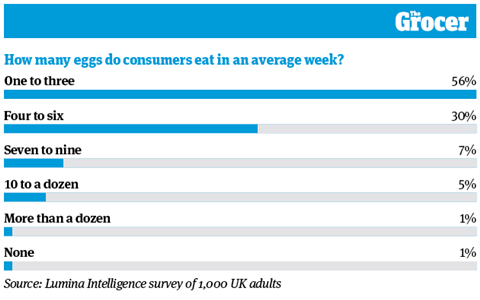
Egg sales may have softened since the lockdown-driven boom of 2020, but the market is still in fine fettle. Indeed, our poll of 1,000 egg-eating consumers reveals that more than two in five (43%) eat at least four eggs every week.
While the majority (56%) eats between one and three eggs in an average week, nearly a third (30%) pack away between four and six. Seven per cent eat between seven and nine eggs and 5% consume between 10 and a dozen.
Consumption is up, says British Egg Industry Council chairman Andrew Joret. “During the pandemic sales rose dramatically, as people spent more time at home,” he says. “Sales have since settled down but increasing egg consumption remains the long-term trend with sales continuing to grow on pre-pandemic levels.”
2. Scrambled eggs are Britain’s most popular serve
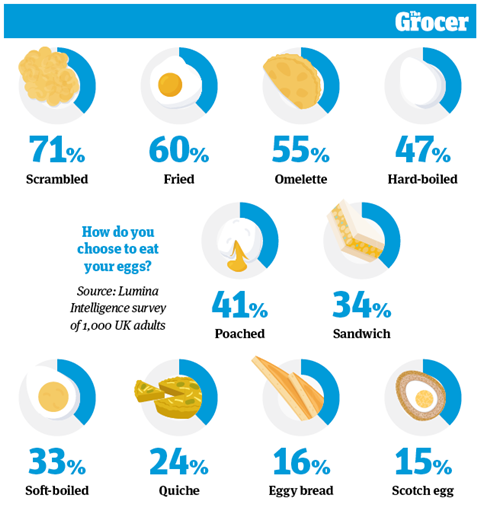
Scrambled rules supreme when it comes to how Brits like their eggs. Seventy one per cent of our sample regularly plumps for scrambled, making this the most popular way to consume eggs. Second most popular is fried, with 60% of the vote; third is omelette, with 55%.
Preferences vary from region to region, however. Scrambled eggs are the most cited serve in every part of the UK but the popularity of fried, hard-boiled, poached and soft-boiled eggs and omelettes depends on who’s cooking (and eating).
In the northeast of England, for example, people rate fried as highly as scrambled eggs; both get 73% of the vote. In Yorkshire, omelettes are the second most popular serve after scrambled eggs (70%), with 60% tucking into omelettes and 58% eating fried eggs.
3. The East Midlands is the spiritual home of the runny egg
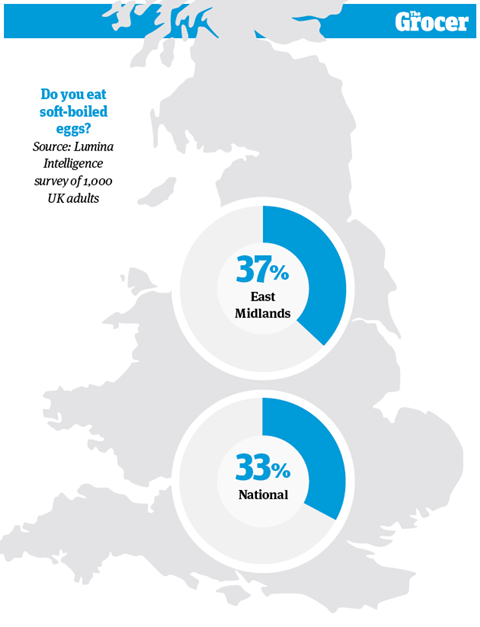
Our research also reveals the nation’s love of a dippy egg. On a national level, a third of consumers (33%) regularly tuck into soft boiled eggs. Other soft serves such as fried (60%) and poached (41%) provide further evidence of this, although hard boiled eggs won 47% of the vote.
People seem particularly partial to runny eggs in the East Midlands, the only part of the UK where soft boiled and poached are more popular than hard boiled eggs. Thirty seven per cent of people in the East Midlands enjoy soft boiled and poached eggs, making them joint fourth. Hard boiled is fifth with 32% of the vote.
4. 22% would only eat runny eggs if they’re British Lion assured
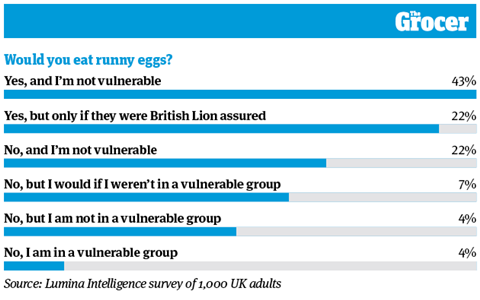
Certain vulnerable groups – such as pregnant women, babies and the elderly – need to consider their choice of egg carefully if they’re going to eat them runny, because of the risk of salmonella contamination in eggs that aren’t approved by the Food Standards Agency.
Indeed, 22% of the people we polled will only eat runny eggs if they are British Lion assured, meaning that they have been subject to a comprehensive suite of food safety measures. “You can’t underestimate the British public’s love of runny eggs,” says Joret.
“The FSA’s change of advice in 2017, confirming that vulnerable groups can once again eat runny eggs, as long as they are Lion marked, reintroduced eggs to a huge portion of consumers who’d previously been restricting consumption.”
5. 40% of shoppers see eggs as a great meat alternative
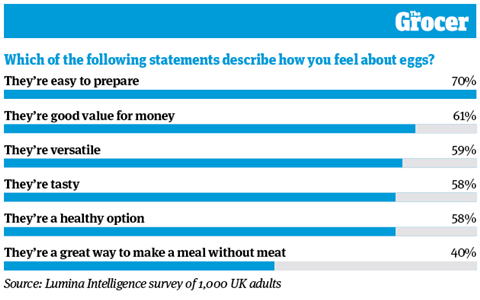
Convenience, value for money and versatility are the key advantages of eggs in the eyes of shoppers, cited by 70%, 61% and 59% of respondents respectively. This is probably not that surprising, given that half a dozen eggs costs around £1.10 and pack more protein than a serving of chicken breast.
More interesting is the fact that 40% see eggs as a great alternative to meat, suggesting that suppliers and retailers could drive more growth for the sector by targeting shoppers who are looking to reduce their meat consumption or cut it out altogether.
6. Two thirds of shoppers trust British more than imported eggs
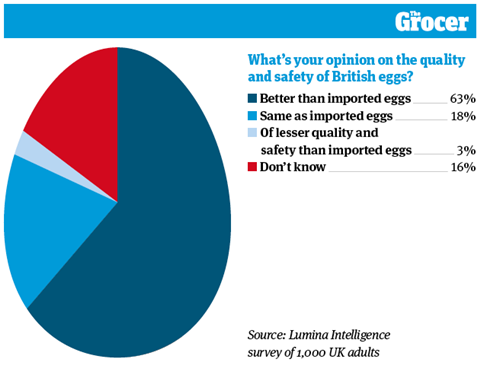
Nearly two thirds (63%) of consumers believe that the quality and food safety standards of British eggs are superior to those produced in other countries. Joret says this is testament to the safeguards put in place by the UK industry.
“British Lion eggs are produced to the world’s most comprehensive egg safety standard, while there have been ongoing food safety issues associated with foreign eggs,” he adds. “A joint report from the FSA and FSS this summer backed this up, highlighting ‘significant’ food quality risks from the import of certain food products, including eggs.”
7. British Lion Mark is most sought-after credential when it comes to eggs
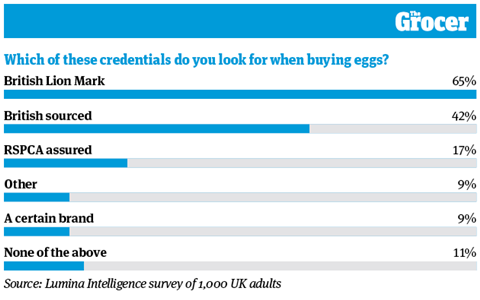
That message seems to be getting out, with 65% of shoppers telling us that they look for the British Lion mark when shopping for eggs. That makes it the most sought-after credential by a country mile, ranking higher than British sourced and RSPCA assured. Not bad for a mark that’s only 24 years old.
8. Food safety, welfare and quality are top reasons for buying British Lion
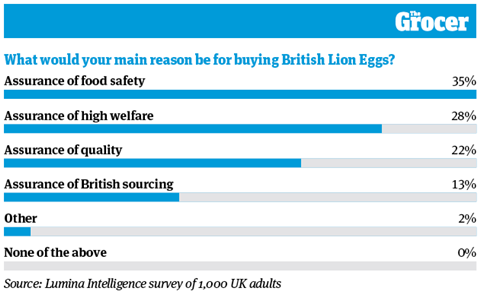
But why do shoppers look for the British Lion mark when shopping for eggs? The results are clear: the assurances that the mark gives on food safety, animal welfare and quality are most important to the people we polled.
“This is great news, and what we’d expect to see,” says Joret. “Consumers have long associated British Lion eggs with quality, safety and high standards of hen welfare as a result of highly targeted consumer marketing campaigns and working closely with retailers to communicate effectively.
“All eggs that carry the British Lion mark meet the stringent requirements of the British Lion Code of Practice which ensures the highest standards of food safety. The independently audited code contains strict food safety controls above and beyond EU and UK legislation and covers more than 700 auditable points from Salmonella vaccination to complete traceability of hens, eggs and feed.”
9. Half of shoppers would be concerned by imported egg use
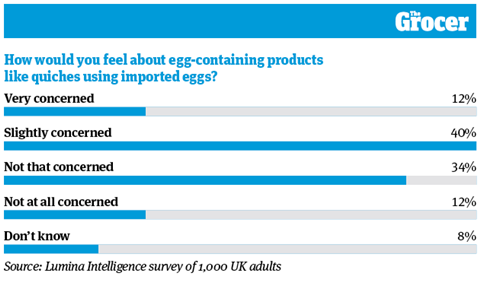
Concerns about the food safety risks associated with imported eggs identified by this summer’s FSA and FSS report appear to be shared with consumers. More than half (52%) of the people we polled said they would be concerned to find imported eggs on the shelves of thei supermarket.
10.Shopper confidence in egg ingredient origins is growing
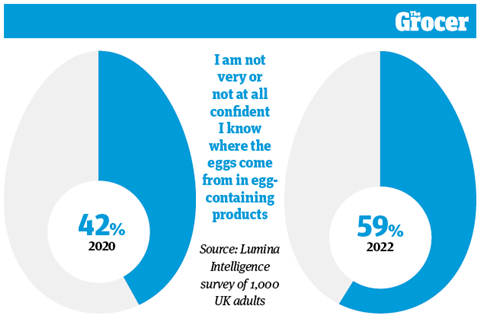
However, consumer confidence about the origin of eggs used as an ingredient in food products appears be growing. When we asked shoppers how confident they were about where eggs used as ingredients came from in 2020, 59% said they were not very or not all confident.
This time around, that number has shrunk to 42%, perhaps because of efforts by retailers to communicate egg ingredient origins on pack. Morrisons, for example launched a range of quiches bearing the British Lion mark this summer.
There could be other explanations, says Joret: “The fipronil scandal in late 2017 and early 2018, which made headline news and drew public attention to the food safety issues associated with imported egg ingredients, will have influenced the previous figures. And while there have been ongoing issues, none have had the same level of impact in the consumer media.”
And he sounds an ominous warning: “While it may be relatively quiet now, history tells us that the next imported eggs scandal is just around the corner.”
Downloads
10 Charts_2022_Eggs_Digital_V2
PDF, Size 1.32 mb







